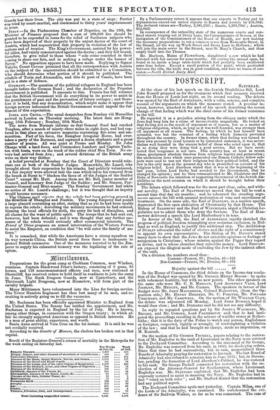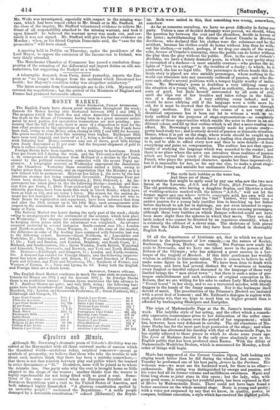POSTSCRIPT.
SATURDAY.
At the close of his last speech on the Jewish Disabilities Bill, Lord John Russell prepared us for the treatment which that measure received from the House of Lords last night, on its second reading. The debate was opened by the Earl of ABERDEEN, with a calm, concise, and complete resume of the arguments on which the measure rested. A peculiar in- terest, however, attached to the part of his speech describing the recent change of that feeling which was the chief cause of his former resistance to the bill.
He regarded it as a prejudice arising from the obloquy under which the Yews had long lain for a crime of inconceivable magnitude. He looked on that feeling not as the result of argument or of reason, but as a matter of religious obligation, which, so long as it was well founded, was stronger than all argument or all reason. The feeling, by which he had himself been actuated, was but the remnant of a feeling which formerly prevailed throughout the country. In former times, when that feeling was turned to their own account by cruel tyrants or by interested statesmen it was never- theless well founded in the sincere belief of those who acted upon it, that in so doing they were doing God a good service. But we have recol- lected that vengeance is not ours. This country has, at least in recent times, proclaimed absolute freedom from religious bigotry and persecution; the unchristian laws which once persecuted our Roman Catholic fellow sub- jects were used to test not their religious but their political belief, and the Jew is the only man at the present day who is proscribed on account of his religious belief. Lord Aberdeen stated that it was at the beginning of the last year, before Lord Derby had acceded to the Government, that he changed his opinion ; and he then communicated to Mr. Gladstone and the Duke of Newcastle his intention of supporting the removal of the Jewish dis- abilities on the next occasion on which it should be brought before their Lordships. The debate which followed was for the most part close, calm, and with- out novelty. The Earl of SHAFTESBURY moved that the bill be read a second time that day six months ; and he rehearsed the standing argu- ments against the bill with unusual moderation of tone and smoothness of treatment. On the same side, the Earl of DARNLEY, in a maiden speech, deprecated the first open abdication of Christianity by that House. The Bishop of SALISBURY and the Earl of WINCHILSEA. urged a Christian Le- gislature not to admit those who deny the Saviour. The Earl of lien- ROWBY delivered a speech like Lord Shaftesbury's in tone. In favour of the bill, the Earl of ALBEMA.B1.E rapidly sketched the progress of political freedom triumphing over sectarian exclusion, in Hol- land as well as England, to justify this additional step. The Archbishop of DUBLEN advocated the relief of electors and the right of a constituency to appoint its own representative. The Bishop of Sr. Davrn's stated many facts to show that the Jews do not entertain opinions or feelings of antagonism to Christians ; whose mission against the Pagan they regard as divine, and to whose churches they subscribe money. Lord BD.OUGH- Am exposed the illogical mode of excluding the Jew by the indirect effect of the oath.
On a division the numbers stood thus : Content—Present, 69; Proxies, 46=115 Not-Content—Present, 96; Proxies, 68.-164 Majority against the bill 49*
In the House of Commons, the third debate on the Income-tax resolu- tion of the Budget was opened by Mr. GEORGE HENRY Moonz : he spoke with vehement hostility, but with no new points. The other speakers on the same side were Mr. C. It. MORGAN, Lord Anorsnes VANE, Lord JOCELYN, Mr. HENLEY, and Mr. Ceram. The speakers in favour of the Budget were Mr. JOHN MACGREGOR, C0101101. HARCOURT, (ja0111 the Op- position side,) Mr. HENRY HERBERT, Mr. C. FORSTER, r. POLLARD URQUHART, and Mr. CA.RDWELL. On the motion of Sir W.n..ris.m CLAY, the debate was adjourned till Monday. Lord SOHN RUSSELL hoped it would then close ; and Mr. Disitszia said he did not see any difficulty.
In reply to repeated questions put by Sir JOSHUA WALMSLEY, Mr. insti- gated and Mr. COBDEN, Lord PALMERSTON said that he had the proceedings resulting in the seizure of warlike stores at Bother-
hithe ; that it is the duty of the Police to watch any person, Englishman or foreigner, suspected, rightly or wrongly, of contemplating a violation of the law ; and that he had brought no charge, made no imputation, on M. Kossuth.
On the motion of Sir GEORGE PECHELL, papers relating to the restora- tion of Mr. Engledue to the rank of Lieutenant in the Navy were referred to the Dockyard Committee. According to the statement of Sir George, Mr. Engledue was removed from his rank, in 1840, for disobeying orders. Since that time he had successively, but in vain, memorialized three Boards of Admiralty praying for restoration to his rank. The last Board of Admiralty had also refused to reinstate him in June 18.52; but, in Decem- ber pending the formation of Lord Aberdeen's Cabinet, he was restored to his rank. Sir George Pechell connected his restoration with the re- election of the Attorney-General for Southampton, where Lieutenant Engledue was. Mr. Srseronn explained, that Mr. Engledue had been expressly restored to assist in manning the Navy. Mr. Engledue had in fact "voted on both sides " ; and Mr. Stafford denied that the restoration had any political aspect. The Dockyard Committee again met yesterday. Captain Milne, one of the Lords of the Admiralty, was examined. He corroborated the evi- dence of Sir Baldwin Walker, so far as he was concerned. The case of Mr. Wells was investigated, especially with respect to the missing war- rant, which had been traced either to Mr. Grant or to M. Stafford. At the close of the inquiry, Mr. Stafford volunteered evidence to relieve Mr. Grant of all responsibility attached to the missing warrant, and took it upon himself: he believed the warrant never was made out, and cer- tainly it was not signed. Mr. Stafford will give his further evidence on Monday ; when, as his friend Captain Duncombe said, the "case for the prosecution" will have closed.



























 Previous page
Previous page